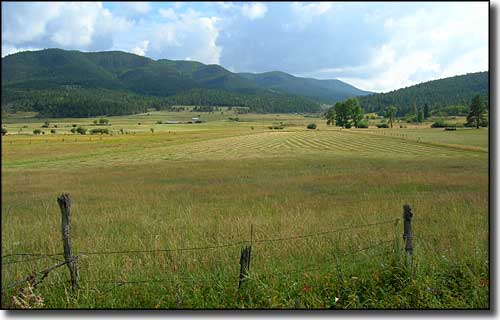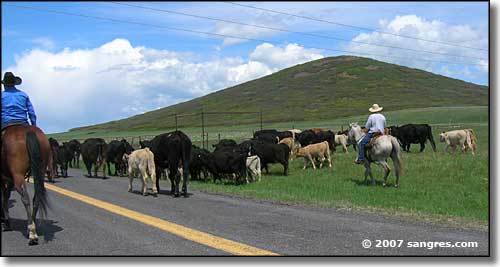 |
|---|
Legal Issues - Minimizing Conflict |
|
|
 |
|
There are four primary areas of conflict between existing agricultural operators and newcomers:
|
|
Dogs can be a Major Problem
Free roaming dogs threaten wildlife and livestock. Dogs can and will kill young animals. When dogs chase animals, the animals get stressed and can hurt themselves. They can also get high-strung, more difficult to control and don't gain weight properly. This directly affects the profitability of a ranch and can damage wildlife populations. Ranchers have a legal right to protect their livestock, even if this means shooting your dog while it's bothering their livestock. It is also unlawful for your pets to bother wildlife. To remedy this problem (and keep your pets alive), keep them on your property and under your control. As an illustration of this problem, one day when I lived in Santa Fe, NM, I was driving on the east side of town. It was an area with a few houses and a lot of open space. A couple was walking down the street with three unleashed dogs running around. As I approached, they ran out in the street and forced me to stop. I rolled down my window and the male told me (in his East Coast accent) to be careful not to run over their dogs. I replied that I have dogs, too, and if he was really concerned for his own dogs' welfare, he should leash them when near a public road. She then stated that this is the wild west and animals should be allowed to run free. I looked at her and replied, "Yes, this is the wild west, and I'm just as free to run over your dogs if they run into the street. Now get out of my way and go back where you came from, you won't last long here. And I feel sorry for your dogs, their masters are idiots." To city folks this may seem harsh but I have lived in the country for a great part of my life. I value my dogs very highly. I even have a bumper sticker on my vehicle that says: The more people I meet, the more I like my dog. |
|
Land Stewardship
To be a successful farmer or rancher, you must have strong ethics toward land stewardship. Many newcomers have similar ethics toward the land but they don't know the nitty-gritty of things like weed control and overgrazing. For example, if you don't deal with your noxious weeds, they will grow and reseed your neighbor's property and then he has to deal with it, again. And most of these noxious weeds are poisonous to his livestock so you might be threatening his livelihood. Overgrazing is a clear sign of negligent land management. It leads directly to serious weed problems and soil erosion. All the ethics in the world mean nothing if they aren't applied properly. Your local county extension agent is available to help you deal with these problems, and he'll have suggestions on how to mend fences with your neighbors. |
|
Minding Fences
Under Colorado law, each landowner must equally share in the cost of constructing and maintaining fences that delineate common property lines. Getting to know your neighbors and working out fence issues with them will aid everyone in preventing unwanted livestock trespass. The fence law also says a rancher cannot just open a gate and allow his animals onto your land without your explicit permission. However, grazing livestock that are not controlled by fencing may roam anywhere they please. Colorado is a "fence out" state: if you don't want livestock on your property, you have to fence them out. It's not just on the rancher to fence them in. See About Fences for more info. |
|
About Privacy and Private Property
Ranchers and farmers tend to know exactly where their fences and property lines are. Newcomers usually don't. Newcomers also quite often have preconceived ideas about the meanings and uses of "open range" and federal or state owned land. For example, I live very close to a state wildlife area. It is completely fenced but there are almost no signs on that fence indicating that it is state land. Come hunting season, my neighborhood is filled with folks in orange who can see the wildlife area on a map but can't find it on the ground. So almost every year, I find a couple of folks on my property, armed to the teeth (and they're going to shoot something to justify the cost of that elk or deer tag) and having no idea of where they are, but insistent that they are on state land and I have no legal right to interfere in what they are doing. It's my property (I know my land very well after 12 years here) but, short of shooting them myself, my only recourse is to call a Wildlife Officer or a Deputy Sheriff. And when one of these guys arrive, the unfortunate hunter is likely to lose his weapon(s), his vehicle and a lot of money for his unintended (but belligerent) trespass. Folks who hear me out get to just walk away with explicit directions as to where they can legally hunt. But it's not a pleasant situation. One way to alleviate this problem is to get a county map that clearly shows public roads and public lands before you go out in the bush. Another thing to do is locate the property owner and ask permission, even if you just want to walk in the meadow. And if that landowner says "No," try to see it from his side: if you get hurt by wildlife or his livestock, or just hurt yourself, he may have to deal with extensive liability issues. You may spend years building trust and friendship with your neighbor before he'll allow you to walk in his meadow or forest. Then again, he may value his privacy very highly or he may have been bitten by the liability issues before and he may never consent to your walk on his land. That's his right, and when the shoe's on the other foot, it's your right, too. Then there's one more thing: fishing and hunting clubs sometimes pay big money to a rancher for a hunting or fishing lease on the rancher's property. The rancher then can't allow you on his property without violating that lease. For all these reasons, neighborly access that was once customary throughout the West is really a thing of the past. |
 |
|
|
 |
| Index - Arizona - Colorado - Idaho - Montana - Nevada - New Mexico - Utah - Wyoming National Forests - National Parks - Scenic Byways - Ski & Snowboard Areas - BLM Sites Wilderness Areas - National Wildlife Refuges - National Trails - Rural Life Advertise With Us - About This Site - Privacy Policy |
| Photos courtesy of Sangres.com, CCA ShareAlike 3.0 License. Text Copyright © by Sangres.com. All rights reserved. |